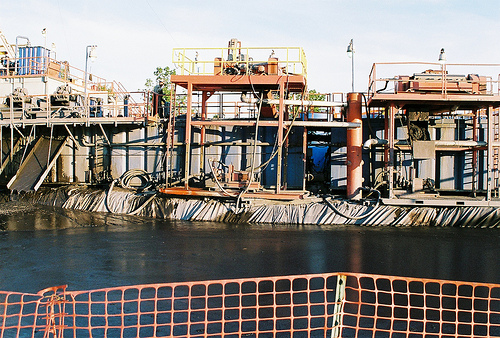Yesterday, on the one-year anniversary of the BP oil spill, a natural gas well in Bradford County, Pennsylvania — perhaps suffering from an overload of irony — ruptured and leaked "thousands and thousands of gallons" of fracking fluid over the surrounding farmland and into a nearby creek. Officials say no gas was released, but local land and waterways were contaminated in a community that depends on farming for its livelihood.
We don't even know for sure what's in this fluid, but it probably sucks, says the Huffington Post:
The chemicals used in fracking fluids have been a contentious subject, as many energy companies have long guarded them as a "trade secret." A recent report released by three House Democrats says that millions of gallons of potentially hazardous chemicals and known carcinogens, such as methanol, have been injected into wells across the country by energy companies using the controversial fracking method.
Residents are concerned but resigned, reports local station WNEP:
"The biggest thing is the footprint on the environment. Well obviously this is a big footprint," said neighbor Ted Tomlinson. "It's one of those things that happens. Gotta live with it, I guess. Here to stay." …
"It's just one of those things," said farm owner Randy Morse. He leased his property to Chesapeake. His beef cattle will no longer be able to drink from the brook that has been contaminated. Morse is broken up over the whole thing, hoping others don't blame him. …
Neighbor Ira Haire is one who does not worry over the leak, saying he trusts Chesapeake will make it right. "I will drink my water. I have salt water as it is," Haire said.
Expect blowouts like this to keep happening, says Tom Laskawy here at Grist:
As with the Gulf, do we really think this sort of thing will never happen again in Pennsylvania? We are, after all, talking about a state where the governor has put industry firmly in charge of regulating itself. For all the big fans of fracking out there, is putting our agricultural lands and water supply at risk really the best path to a low-carbon future? I'm going to answer "no" on that one.
But it can get better if we push for regulation, says Time:
The best tech in the world can't completely eliminate human error, as we saw with the Deepwater Horizon blowout a year ago, and as we may be seeing now in northeastern Pennsylvania. But it's important to remember that fossil fuel extraction—like just about any other business—can get cleaner, greener and more efficient. It often just takes a little nudge from regulators to make it happen.




